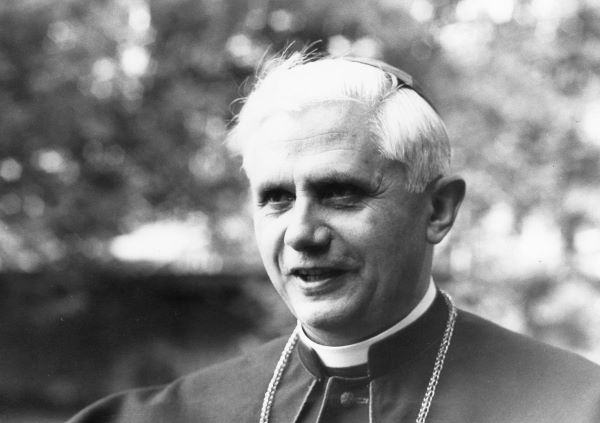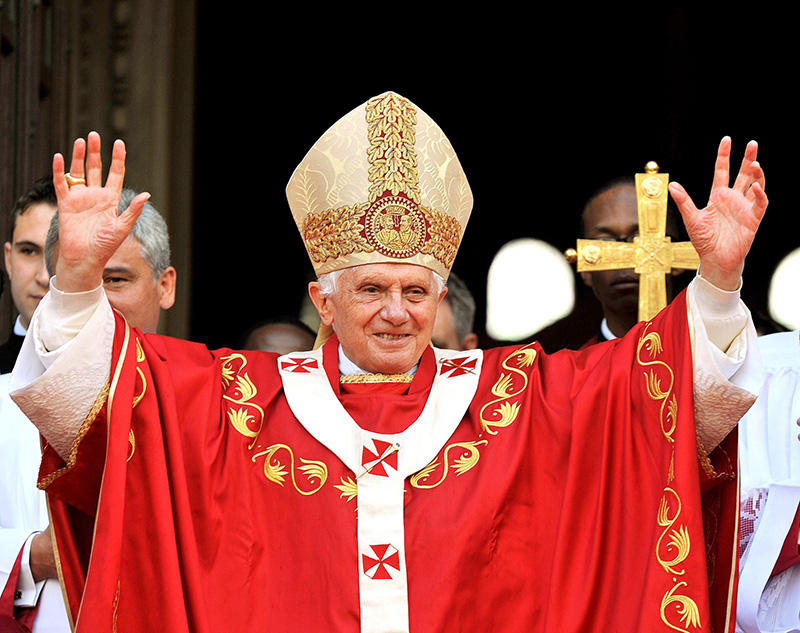Pope Emeritus Benedict XVI died this morning, aged 95, after a sudden deterioration in his health earlier this week due to his advancing age.
At his last general audience of the year, Pope Francis had requested prayers for Benedict, who had been living in the Mater Ecclesiae Monastery in the Vatican since his resignation in 2013.
He was the first Pope in six centuries to resign. Pope Francis described him as “very sick” and the Vatican subsequently clarified that there had been a downturn in his health.
The director of the Holy See press office, Matteo Bruni, said: “With sorrow I inform you that the Pope Emeritus, Benedict XVI, passed away today at 9:34 AM in the Mater Ecclesiae Monastery in the Vatican. Further information will be provided as soon as possible. As of Monday morning, 2 January 2023, the body of the Pope Emeritus will be in Saint Peter's Basilica so the faithful can bid farewell.”
Mr Bruni said that from Monday morning, the body of the Pope Emeritus will be in Saint Peter’s Basilica so the faithful can bid farewell.
Pope Francis will preside at the funeral Mass, on 5 January in the morning. More details are expected to be released soon by the Vatican. Heads of state, other dignitaries, cardinals, bishops and religious are expected to travel from all over the world.
Tributes poured in from across the Church, other religious communities and the world.
The Archbishop of Westminster, Cardinal Vincent Nichols, said: “I am deeply saddened to learn of the death of Pope Benedict.
“He will be remembered as one of the great theologians of the 20th century. I remember with particular affection the remarkable Papal Visit to these lands in 2010.
“He was through and through a gentleman, through and through a scholar, through and through a pastor, through and through a man of God – close to the Lord and always his humble servant.”
Bishop Hugh Gilbert, president of the Bishops’ Conference of Scotland, said: “With the passing of Pope Emeritus Benedict, we lose one of the leading Catholic figures of the second half of the 20th century and the beginning of our own.
“By nature a shy and scholarly man and by profession a priest-theologian, he found himself drawn ever more into public life as Archbishop of Munich, as Prefect of the Congregation of the Doctrine of the Faith in Rome and finally as Pope – the first German since the end of the Second World War to attain world pre-eminence.
“His memorable state visit to the United Kingdom in 2010 began in Scotland. The gentle and prayerful intelligence revealed during that visit disarmed his critics.
“He was often misunderstood, even caricatured. Contrary to a widespread perception, however, he was a resolutely contemporary ‘confessor of the faith’, deeply and critically engaged with modern thought, a lucid and unacademic preacher and pastorally sensitive.
“His bold, independent spirit surprised us all with his decision to resign while in office, the first Pope to do so for centuries.”
Archbishop of Armagh Eamon Martin said: “I am saddened to hear of the death of Pope Emeritus Benedict XVI.
“At this time of mourning in the Catholic Church throughout the world, we remember his gentle soul in prayer, asking God, in His great mercy, to forgive his sins and human failings, while rewarding his generous service and complete dedication to the Gospel and to the Church.
“On behalf of the Irish Bishops’ Conference, and the faithful across Ireland, I extend sympathy to Pope Francis, to the family members and carers of the Pope Emeritus, and to all those in his native Germany and around the globe who loved him and will mourn his loss.”
He said it was Benedict's characteristic humility and gentleness which struck me when he first met him in 2009 while visiting the Vatican.
“I found him to be calm and softly spoken, kindly and personable, and genuinely interested in the Church in Ireland.
“Having met the Irish bishops in Rome in February 2010, he issued a unique Pastoral Letter to the Catholics of Ireland expressing profound sorrow for those grievously wounded by abuse in the Church.
“The then-Pope called for urgent action to address the legacy of abuse which, he said, has had ‘such tragic consequences in the lives of victims and their families’ and which has ‘obscured the light of the Gospel to a degree that not even centuries of persecution succeeded in doing’.
“Pope Benedict XVI’s interest in Ireland goes back to his friendship with the late Archbishop Kevin McNamara of Dublin when both were young theology professors. Former students of the Pontifical Irish College, Rome, also remember fondly his visit there as cardinal.
“He often admired the huge contribution of generations of Irish men and women to the Church, and to humanity, and he took a special interest in the work of early Celtic missionaries like Saint Columbanus to the spread the Gospel in Europe and to Europe’s spiritual identity.”
Dr Phyllis Zagano, senior research associate-in-residence at Hofstra University, Hempstead in New York, who belonged to the 2016-2018 pontifical commission for the study of the diaconate of women, said: “Benedict XVI was an extraordinary theologian who played a central part in almost all major Church discussions throughout the latter part of the twentieth and early twenty-first century.
“Known as the architect of every contemporary statement against women priests, he also codified the distinction between the priesthood and the diaconate, opening the way for women deacons.”
Archbishop of Canterbury Justin Welby said: “Today I join with the Church throughout the world, and especially with the Holy Father, Pope Francis, and all in the Catholic Church, in mourning the death of Pope Emeritus Benedict XVI.
“In Pope Benedict’s long life and ministry of service to Christ in His Church he saw many profound changes in the church and in the world.
“He lived through the Nazi regime in Germany and served briefly in the Second World War. As a younger theologian and priest he witnessed first-hand the discussions of the Second Vatican Council. As a professor and then as an archbishop he lived in a divided Germany but saw too the fall of the Berlin Wall and the reunification of his homeland.
“Pope Benedict was one of the greatest theologians of his age – committed to the faith of the Church and stalwart in its defence.
“In all things, not least in his writing and his preaching, he looked to Jesus Christ, the image of the invisible God. It was abundantly clear that Christ was the root of his thought and the basis of his prayer.
“In 2013 Pope Benedict took the courageous and humble step to resign the papacy, the first Pope to do so since the fifteenth century. In making this choice freely he acknowledged the human frailty that affects us all. In his retirement in Rome he has led a life of prayer and now he has gone to the eternal rest granted by the Father.
“In his life and ministry Pope Benedict strove to direct people to Christ. May he now rest in Christ’s peace, and rise in glory with all the Saints.”
In a statement, Jesuits in Britain said: “The Jesuits in Britain would like to pay tribute to the memory of Pope Emeritus Benedict XVI.
“As Pope, he led the global Church through a delicate period, drawing on his faith and his vast theological expertise to provide spiritual sustenance and stability during turbulent times.
“His historic State visit to Britain in 2010 strengthened the faith of many Catholics here and cemented friendly and fruitful relations between the UK and the Holy See.
“The Jesuits have a special, affective bond to the Pope, expressed in a vow of obedience to him in regard to missions. We pray for him in death as in life.
“Pope Benedict was unfailingly generous in his understanding of our vocation of service to the Church, and for this we will always be grateful.”
The World Council of Churches mentioned his contribution to ecumenism: “Within a short time of Benedict becoming Pope, longstanding grievances that had prevented meetings of the Catholic-Orthodox dialogue commission were swept aside.”
Raymond Friel, CSAN chief executive, said: “Pope Emeritus Benedict XVI has died. He was a great gift to the Church for his intellect, his spirituality, and for his courage, not least for resigning when he knew he did not have the strength to continue as Pope. May he rest in peace and rise in glory.”



 Loading ...
Loading ...